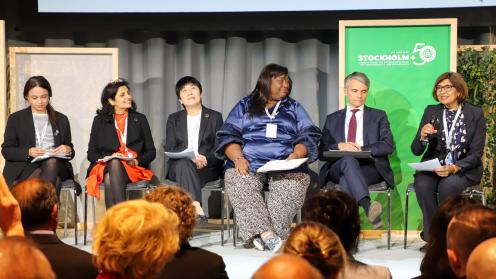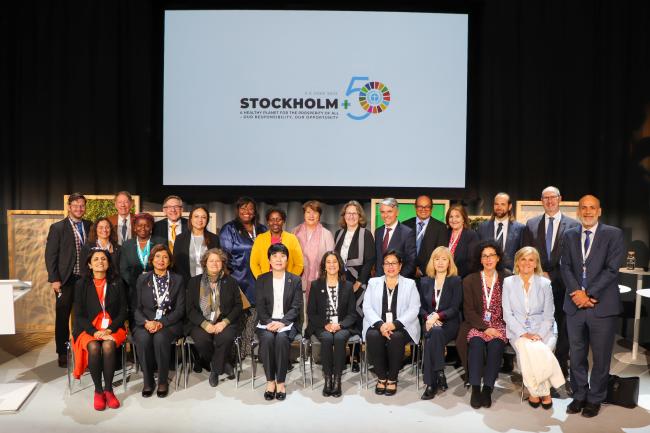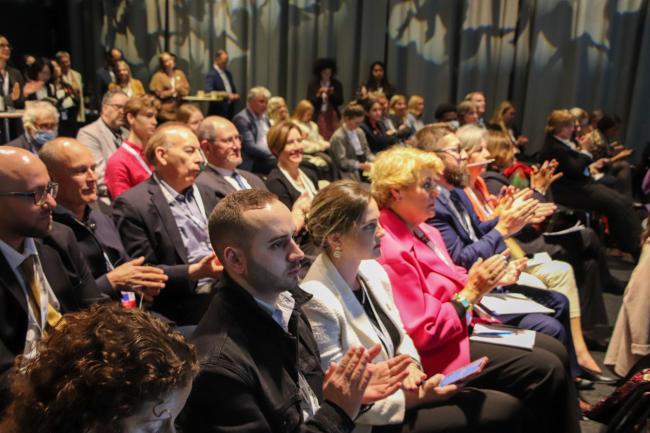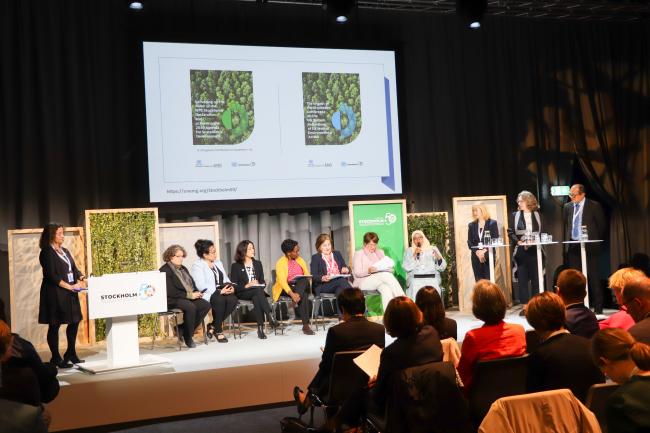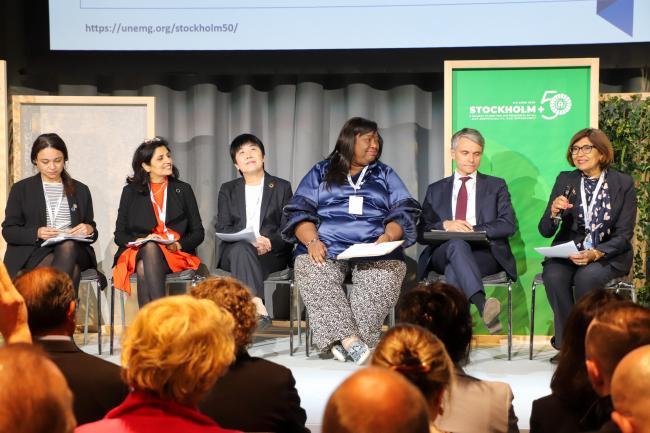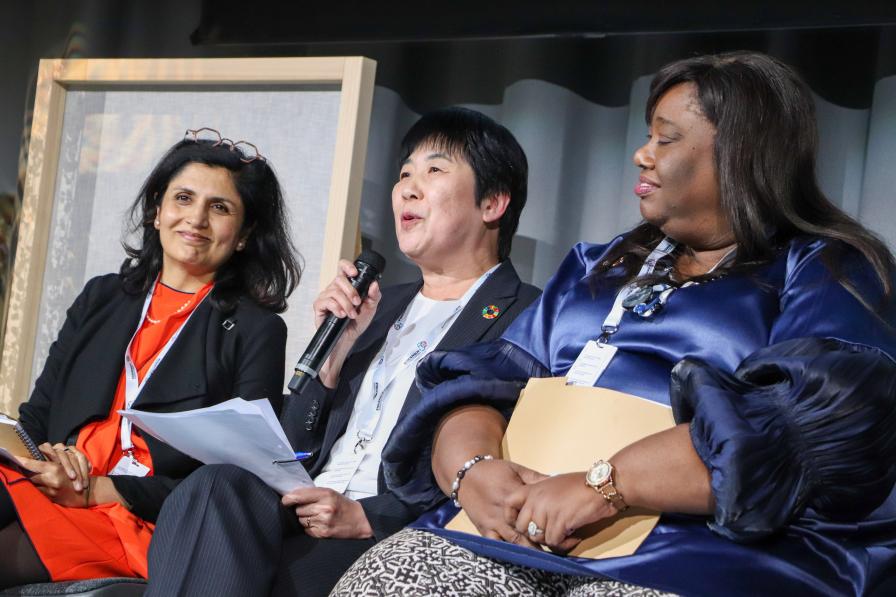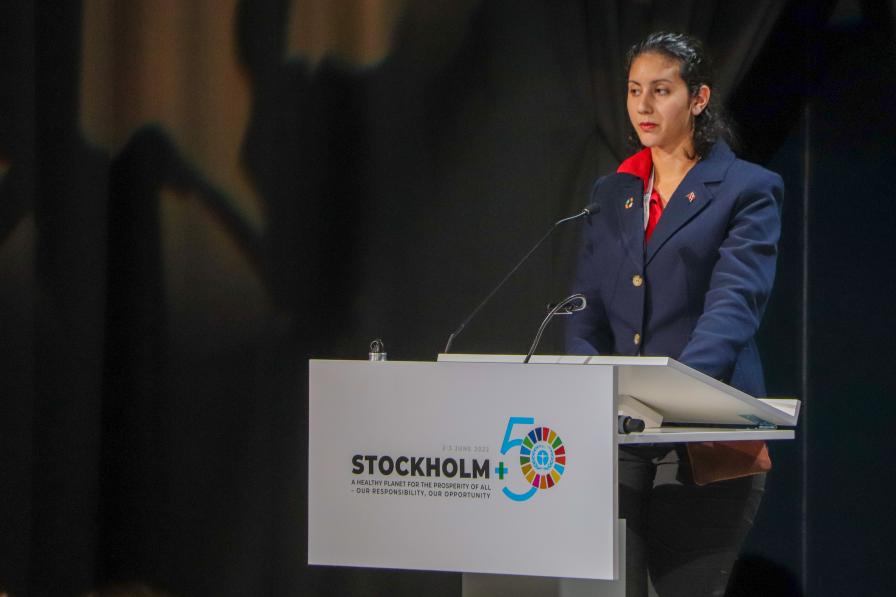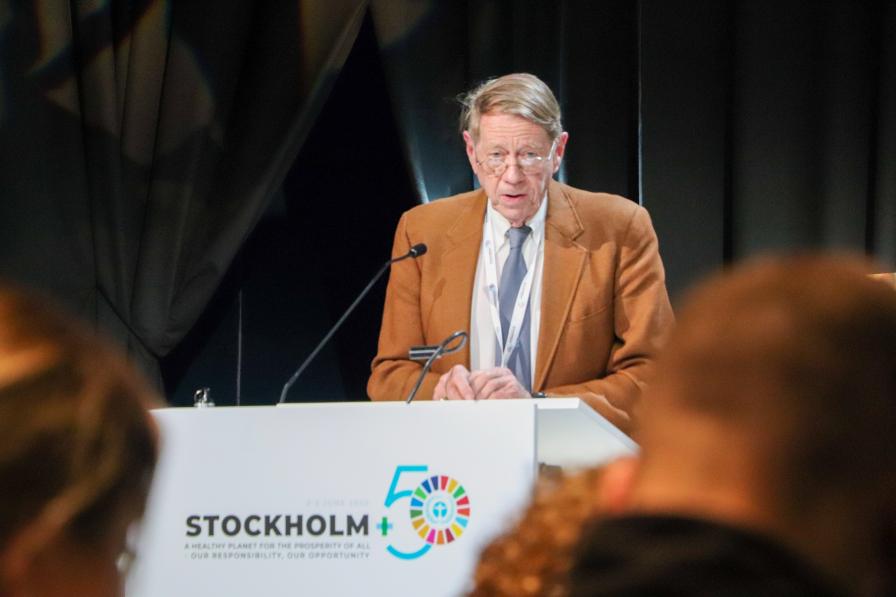About
A room full of the heads of UN agencies and leadership of MEA Secretariats gave the chance for an authoritative discussion on how to break down silos and speed collaborative action on urgent issues.
Organized by: UN Environment Management Group
This event featured a roundtable discussion with Heads of UN Agencies, who shared their views on opportunities and priorities for accelerating delivery of the environmental dimension of the Sustainable Development Goals (SDGs), as the UN system begins the next 50 years towards achieving a healthy planet for the prosperity of all.
Key messages from the event include that:
- The human right to a healthy environment represents a new opportunity for implementation of international environmental commitments and responding to the triple planetary crisis;
- Multilateral environmental agreements' (MEA) national focal points need to coordinate among themselves and with focal points for other UN agencies at the country level;
- The environmental agenda is inter-related, requiring breaking down silos, reinvigorating multilateralism, and enhancing partnerships; and
- The UN system needs to better engage with the private sector.
Sonja Leighton-Kone, Acting Deputy Director, UN Environment Programme (UNEP), on behalf of UNEP Executive Director Inger Andersen, welcomed everyone, noting the importance of cross-agency collaboration in implementing the environmental dimension of the SDGs. She stressed the important role of the UN Environment Management Group (EMG) in strengthening this collaboration.
Jan-Gustav Strandenaes, Stakeholder Forum, presented key messages from the Forum, including calling for a mechanism through which members of civil society and non-state actors can input ideas and issues into the work of the EMG, and calling on the EMG and its member organizations to integrate and implement the right to a healthy environment.
Two panels comprised of 16 UN agency and MEAs heads and deputies were asked what the UN system can do to better accelerate integrated action for a healthy planet (the environmental dimension of sustainable development) going forward and how UN agencies can respond to and help implement MEAs on the ground.
Maimunah Mohd Sharif, Executive Director, UN Human Settlements Programme (UN-Habitat), said we have to work through a whole of UN approach and in partnership and noted the importance of collaborating with cities, especially with regard to reducing carbon emissions.
Zoritsa Urosevic, Executive Director, UN World Tourism Organization, said tourism is cross-cutting across sectors and described the collaboration with UNEP on sustainable consumption and production and the circular economy through the One Planet network (which provides the umbrella for initiatives such as the Glasgow Declaration on Climate Action in Tourism and the Global Tourism Plastics Initiative), as well as with other UN agencies on health, safety, transport, the economy, and trade.
Caroline Dumas, Director General's Special Envoy for Migration and Climate Action, International Organization for Migration, discussed the need to reduce the displacement of people due to climate change and disasters, calling on the UN system to integrate the environmental dimension into the humanitarian, development, and peace nexus.
Elizabeth Mrema, Executive Secretary, Convention on Biological Diversity, stressed the need to accelerate integrated action and move away from silos, emphasizing that all UN agencies have a role to play. She said a whole of society and a whole of UN approach is necessary to address the root causes and solutions to biodiversity loss, which are linked to the human relationship with nature.
Martha Rojas Urrego, Secretary-General, Ramsar Convention on Wetlands, said while the environment has become more central, we are still far from the level of integration that is needed. The environment should not be seen as the problem, but rather the solution, she emphasized.
Ivonne Higuero, Secretary-General, Convention on International Trade of Endangered Species of Wild Fauna and Flora (CITES), said each convention has legally binding decisions taken by Conferences of the Parties. She said UN agencies should take these decisions and integrate them into their programmes, like CITES is doing with the International Criminal Police Organization (Interpol) and the UN Office on Drugs and Crime.
Amy Fraenkel, Executive Secretary, Convention on the Conservation of Migratory Species of Wild Animals, said the UN is taking steps to better integrate environmental concerns into the UN's country-level approach. However, she explained, every UN agency needs to incorporate the environment and nature in their work, and prioritize efforts to address drivers of unsustainable development.
Megumi Seki, Executive Secretary, Ozone Secretariat, said UN country teams help overcome fragmentation, and enable all stakeholders to participate in the development and implementation of sustainable development programmes, adding that national ozone officers should also participate in this effort.
Monika Stankiewicz, Executive Secretary, Minamata Convention on Mercury, said in 20 years she wants the Minamata Convention to be obsolete and noted UN agencies have an important role to play in its implementation and by supporting ratification.
Rolph Payet, Executive Secretary, Basel, Rotterdam and Stockholm (BRS) Conventions, demonstrated how the BRS Conventions can work with each of the other MEAs and agencies present on the stage, illustrating the important role that chemicals play in their work.
Maria Helena Semedo, Deputy Director-General, Food and Agriculture Organization of the UN (FAO), stressed the need for a more resilient, inclusive, and sustainable food system. She described how FAO is working with MEAs to support their implementation.
Dmitry Mariyasin, Deputy Executive Secretary, UN Economic Commission for Europe, said to accelerate implementation we need to support people in Member States to take action by making existing commitments fit for purpose and continuing dialogue, despite complexities.
Sonja Leighton-Kone, Acting Deputy Executive Director, UNEP, said the environment cannot be an afterthought, called for breaking down silos, and stressed the need to work more with the private sector to find solutions.
Naoko Yamamoto, Assistant Director-General for Universal Health Coverage and Health Systems, World Health Organization, said UN agencies can all promote decarbonization, stressed the need for joint action, and recognized the importance of data and evidence that can be shared across agencies.
Jyotsna Puri, Associate Vice-President of the Strategy and Knowledge Department, International Fund for Agricultural Development, discussed the important role of scientific evidence, investment from the public and private sectors, and innovation.
Andrea Meza, Deputy Executive Secretary, UN Convention to Combat Desertification (UNCCD), discussed the common drivers of poverty, migration, and biodiversity loss, and how UN agencies can work together to support governments, including through coordinated and integrated projects and reporting.
Arthur Dahl, President, International Environment Forum, who participated in the 1972 Stockholm Conference, and Christianne Zakour, Children and Youth Major Group, concluded the session by providing an intergenerational perspective on the need for accelerating integrated action for a healthy planet.
Contact: Hossein Fadaei hossein.fadaei@un.org
Jannica Pitkanen Jannica.pitkanen@un.org
More information: unemg.org/stockholm50/
To receive free coverage of global environmental events delivered to your inbox, subscribe to the ENB Update newsletter.
All ENB photos are free to use with attribution. For photos of main events during Stockholm+50, please use: Photo by IISD/ENB | Kiara Worth.
Select photos

Megumi Seki, Ozone Secretariat, Monika Stankiewicz, Minamata Convention on Mercury, Rolph Payet, Basel, Rotterdam, and Stockholm Conventions
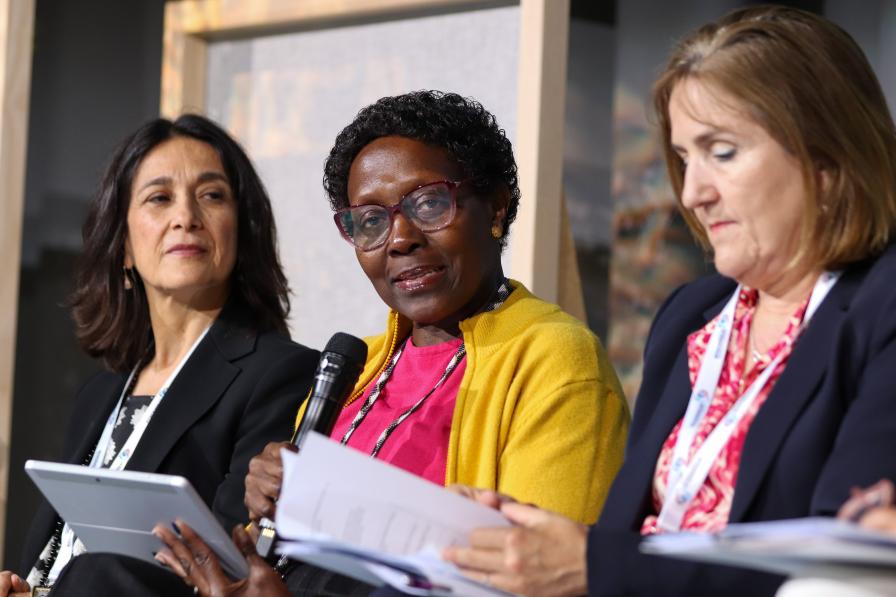
Martha Rojas Urrego, Ramsar Convention on Wetlands, Elizabeth Mrema, Convention on Biological Diversity, and Caroline Dumas, International Organization for Migration

Amy Fraenkel, Convention on Migratory Species, Ivonne Higuero, CITES, and Martha Rojas Urrego, Ramsar Convention on Wetlands

Naoko Yamamoto, World Health Organization, Sonja Leighton-Kone, UN Environment Programme, Dmitry Mariyasin, UN Economic Commission for Europe, Maria Helena Semedo, Food and Agriculture Organization
